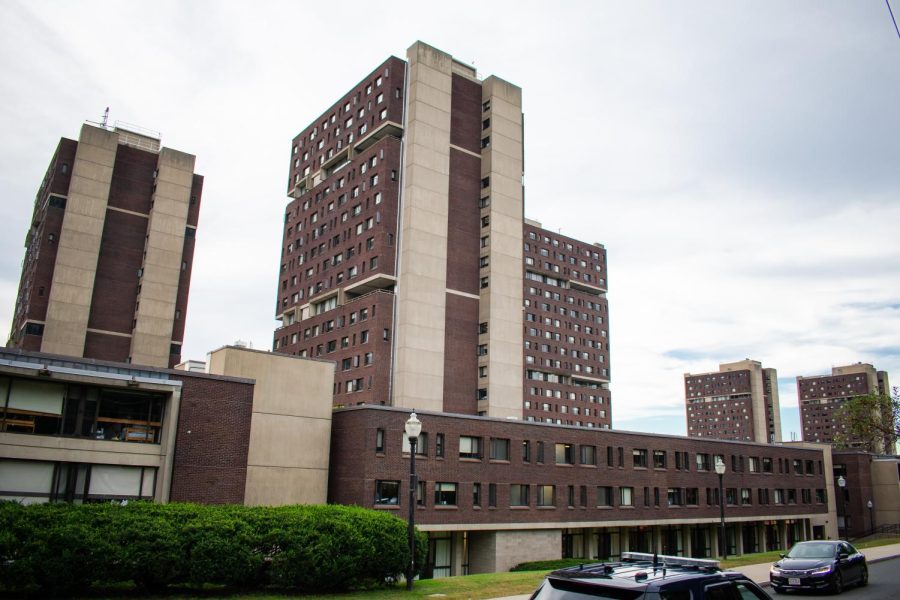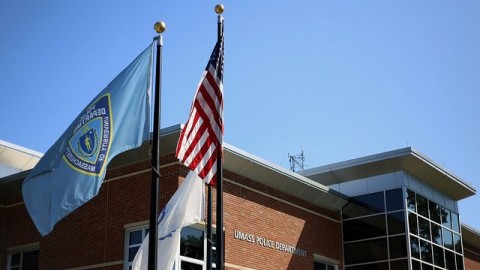
Councils presented closing arguments and the jury retired to begin deliberations Friday morning in the trial of Emmanuel T. Bile Jr., 21, of Pittsfield, for his alleged involvement in a 2012 gang rape at the University of Massachusetts.
Bile has pled not guilty to three counts of aggravated rape after being accused of raping a woman in her Pierpont Hall dorm room in the Southwest Residential Area on Oct. 13, 2012, while she was intoxicated.
In his closing argument, defense attorney David A. Pixley of Pittsfield told jurors Bile showed no intent to rape and used no force or threat of injury during the incident. His case is different than the other three men involved, Pixley said, because it was the others who spent the majority of time with the woman.
However, in the prosecution’s closing argument, Assistant Northwestern District Attorney Jennifer Suhl said the woman did not consent to sex as the men argued over what position and in what order they would have sex in, describing it as a “constant rotation.”
“He’s not the good guy and they’re the bad guys, he’s just as much a part of the group, he’s just as much a part of what happened,” Suhl told jurors.
In order to be charged with aggravated rape, the jury must find that Bile committed the crime by joint venture, meaning that he participated in the crime in a meaningful way with the same intent as the other men. If the jury does not find enough evidence of joint venture, then Bile could still be found guilty of rape.
Pixley argued that there was no indication of joint venture and a lack of evidence of any premeditated plan involving the woman.
However, Suhl told jurors evidence of a premeditated plan isn’t necessary to find joint venture.
“(Bile) was part of the group, he was part of the rotation,” Suhl said.
Judge Jeffrey C. Kinder reminded jurors that consent cannot be given if the person has been rendered incapacitated by alcohol, drugs, unconsciousness or helplessness. In that case, the only force needed to satisfy the legal definition of rape is the force necessary to penetrate.
Suhl said that the alleged victim was drunk to the point where she did not have the ability to consent.
“The defendant knew that,” she said.
Pixley argued that the woman displayed no visible signs of intoxication, such as slurred speech or difficulty walking. Suhl, however, disagreed in her closing argument, saying the woman could barely even sit up on her own and felt “paralyzed” during the alleged rape.
Suhl also pointed out inconsistencies in Bile’s recollections of the incident.
When interviewed by police several days after the alleged rape, Bile said the woman was drunk. However, during his testimony yesterday, he told jurors she was actually “tipsy.”
Suhl told jurors the defense has a motive to downplay her level of intoxication now, as opposed to when Bile was initially interviewed by police before being charged with the crime.
Pixley argued that Bile did nothing wrong and had no reason to conceal his activities that night, referencing a security video from the dorm showing Bile walking around at 1:40 a.m.
“They certainly weren’t trying to hide themselves in that building,” Pixley said.
However, the prosecution pointed to the dorm security video as evidence that Bile wasn’t actually as drunk that night as he claimed to be.
During his testimony Thursday, Bile said he was so intoxicated that he had trouble walking once he got into the building. However, the video shows him jogging up and down the stairs.
Suhl said Friday that Bile wants jurors to give him a “free pass” because he was drunk.
“Being under the influence of alcohol is not an excuse to rape someone,” she said.
Pixley also argued that, presence of alcohol aside, it was difficult for his client to judge consent when he came into the room and two of the other men were already having sex with the woman. Bile said he made eye contact with her and engaged in foreplay without objection.
Suhl contested whether this interaction was actually a form of consent.
Suhl also told jurors that the woman’s “sexual moaning” Bile described in his testimony Thursday was actually from the extreme pain she was in during the alleged rape.
After the closing arguments, Judge Kinder gave jurors the principles of law and instructed them on how to properly deliberate and present their verdict.
Trials for the other three men – Justin King, 21, of Pittsfield, Caleb Womack, 20, of Windsor Locks, Connecticut and Adam Laccardi, 20, of Pittsfield – have not yet been scheduled.
Aviva Luttrell can be reached at [email protected] and followed on Twitter @AvivaLuttrell. Anthony Rentsch can be reached at [email protected] and followed on Twitter @Anthony_Rentsch.


















Bob • Mar 27, 2015 at 8:04 pm
Lock him up for a long, long time. Then send the other three to join him. I wonder whether the girl who signed in these losers will face a lawsuit? Many questions the Collegian is avoiding.